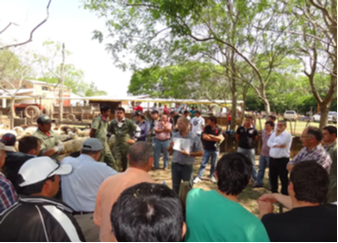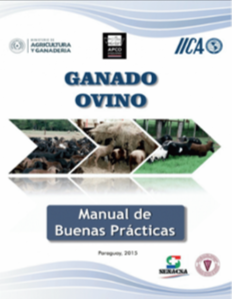In 2014, the Vice Ministry of Livestock and the Paraguayan Association of Sheep Husbandry (APCO) requested IICA´s support to promote the competitiveness and sustainability of the sheep value chain.

Considering that family agriculture is responsible for almost 60% of the national sheep production; Paraguay´s Ministry of Agriculture and Livestock recognized the great potential of the sheep value chain in contributing to the development and food security of small and medium sized producers.
In 2014, the Vice Ministry of Livestock and the Paraguayan Association of Sheep Husbandry (APCO) requested IICA´s support to promote the competitiveness and sustainability of the sheep value chain.
As a first step, a group of actors from every link of the value chain identified the main challenges facing the chain as well as potential solutions. The stakeholders identified the need to strengthen the governance of the chain with full participation from the actors; create mechanisms and promote training programs for producers in topics related to safety and management of herds, agribusiness and commercialization and other related topics. In addition, actors recognized the importance of promoting associativity and strengthening producer organizations, including initiatives to incentivize the participation of new members, especially youth. Finally, to promote public-private partnerships among producer organizations, the public sector, meatpackers, input providers, traders, transporters, and other actors in the chain.
The group of stakeholders agreed to focus the initial efforts on strengthening the chain governance, animal health and food safety (AHFS) institutions, and designing and implementing capacity-building topics to strengthen good production practices.

Regarding the strengthening of the chain governance, a base line study including a registry of producers and an inventory of animals was develop and a strategic plan to improve the competitiveness of the chain was defined. In addition, the Sheep Value Chain Board, formed by public and private actors was created and institutionalized (Ministerial resolution in process).
IICA, the National Quality and Animal Health Service (SENACSA), the Vice Ministry of Livestock, and (APCO) teamed up to implement a national plan for sheep health. At present, more than 226 technicians have been trained and are putting into practice their new skills.
More than 150 producers have been trained and are implementing good practices in sheep production, using the Manual for Good Practices in Sheep Production as reference.
Currently, IICA and its partners are working together in the implementation of the activities of the Strategic Plan programmed for 2017, and are seeking resources and support from other institutions to scale-up results.
More information: daniel.rodriquez@iica.int
*This post appears in the IICA Delegation in the USA Newsletter – July – August 2017











